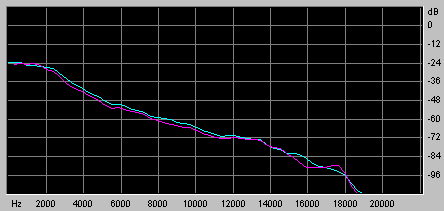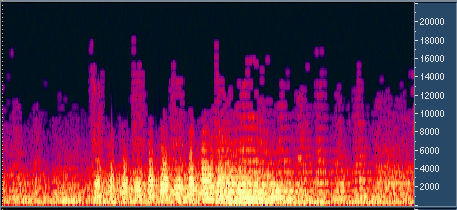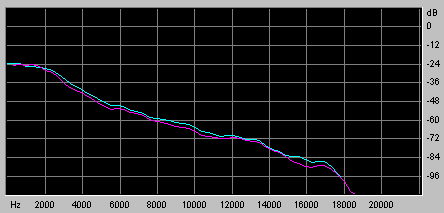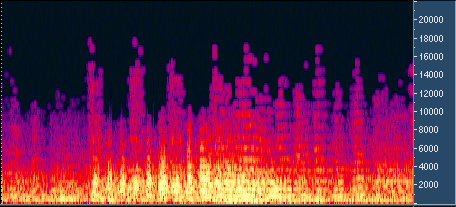I tested both the PsyTEL and MBSoft AAC encoders as
there is no clear cut winner in the field yet. Both codecs produce
very similar results. I used the MBSoft plugin for WinAmp to do
the decoding in both cases. The Homeboy plugin gives essentially
the same results.

MBSoft 128kb/s AAC Frequency Response

MBSoft 128kb/s AAC Spectral View

PsyTEL 128kb/s AAC Frequency Response

PsyTEL 128kb/s AAC Spectral View
Both encoders produced virtually identical graphs
for the 128kb/s data rate. The frequency response is identical to
the source up to 10kHz but above this is suppressed when compared
to the source and rolls of gently to about 19kHz.
The spectral view shows the presence of considerable
amounts of high intensity material right up 19kHz but heavy pruning
of lower intensity high frequency components is obvious right down
to 10kHz. This gives the spectral view a chunky appearance as compared
to MP3 encoded material.
In listening tests I felt that the MBSoft encoder
produced a warmer sound than the PsyTEL encoder but the fine detail
was slightly fuzzy. Overall I think the PsyTEL encoder produces
a slightly better result. I did have a problem with the PsyTEL encoder
in that it would not function correctly under NT4 and had to run
it under Win95 to encode the file.
The 128kb/s AAC file definitely sounds better than
a 128kb/s MP3 file. There were no obvious artifacts and the sound
has good presence. On the whole though I feel that 160kb/s MP3 files
sound better. As there is still a lot of refinement to be done on
the AAC codecs I may have to change this opinion in future.
The shocker comes when you see the resources
needed to play back the file. On my machine it consumed a whopping
55% of CPU time to decode the output on playback. This reminds me
of the early days of MP3 players and we will most probably see a
big drop in CPU utilization when the codecs are refined.
At this stage I do not feel that AAC encoding is ready
to replace MP3 for general purpose use. The much longer encoding
times and higher CPU utilization on playback overshadow the benefit
of better sound quality than MP3 at 128kb/s.
An alternative encoding scheme to AAC in the MP4 stable
is NTT and Yamaha's TwinVQ encoding technique. We examine this in
the section below.
[Back] [Next]



